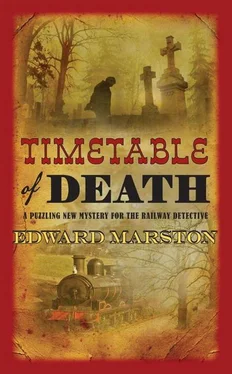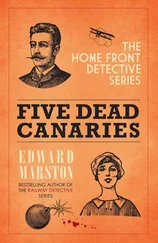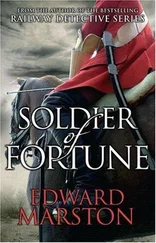Edward Marston - Timetable of Death
Здесь есть возможность читать онлайн «Edward Marston - Timetable of Death» весь текст электронной книги совершенно бесплатно (целиком полную версию без сокращений). В некоторых случаях можно слушать аудио, скачать через торрент в формате fb2 и присутствует краткое содержание. Год выпуска: 2015, ISBN: 2015, Издательство: ALLISON & BUSBY, Жанр: Исторический детектив, на английском языке. Описание произведения, (предисловие) а так же отзывы посетителей доступны на портале библиотеки ЛибКат.
- Название:Timetable of Death
- Автор:
- Издательство:ALLISON & BUSBY
- Жанр:
- Год:2015
- ISBN:9780749018122
- Рейтинг книги:4 / 5. Голосов: 1
-
Избранное:Добавить в избранное
- Отзывы:
-
Ваша оценка:
- 80
- 1
- 2
- 3
- 4
- 5
Timetable of Death: краткое содержание, описание и аннотация
Предлагаем к чтению аннотацию, описание, краткое содержание или предисловие (зависит от того, что написал сам автор книги «Timetable of Death»). Если вы не нашли необходимую информацию о книге — напишите в комментариях, мы постараемся отыскать её.
Timetable of Death — читать онлайн бесплатно полную книгу (весь текст) целиком
Ниже представлен текст книги, разбитый по страницам. Система сохранения места последней прочитанной страницы, позволяет с удобством читать онлайн бесплатно книгу «Timetable of Death», без необходимости каждый раз заново искать на чём Вы остановились. Поставьте закладку, и сможете в любой момент перейти на страницу, на которой закончили чтение.
Интервал:
Закладка:
When he left the station, Colbeck made for the cab rank. He had not needed to ask anyone where Quayle had lived because the man’s address had been printed in that morning’s edition of the Derby Mercury . The cab drove to the edge of the town before turning into the gateway of an estate. Filtered by the trees, bright sunshine was casting intricate shadows over the winding track. When he emerged from a hundred yards or more of woodland, Colbeck saw ahead a well-tended lawn edged with flower beds and, beyond it, a large Jacobean mansion in an impressive state of repair. Having met many railway magnates in the course of his work, Colbeck was used to seeing the high standard of living that they enjoyed, but Vivian Quayle’s abode was more sumptuous than most.
The cab stopped well short of the house because a uniformed policeman stood in its path with his hand raised. He came over to eye the passenger.
‘This is a house of mourning,’ he said, crisply. ‘No visitors are allowed.’
‘I’m not a visitor, Constable. My name is Inspector Colbeck and I’ve been summoned from Scotland Yard to lead the murder investigation. It’s imperative that I talk with a member of the family.’
The man was suspicious. ‘How do I know you are who you say you are?’
‘You simply have to look into my eyes.’
Colbeck gazed at him with an intensity and a sense of authority that made the policeman back away. Producing a weak smile of apology, he stood aside and waved the cab on. The man had been officious but Colbeck approved of his being there to keep unwanted visitors at bay. Quayle’s murder would have set the local press buzzing and the last thing that the family wanted at such a time was a demand from reporters to make a statement. They would still be reeling from the thunderbolt that had hit them. Colbeck needed to behave with the utmost tact.
When the cab drew up outside the house, he asked the driver to wait then went to the front door. It opened before he could even reach for the bell and he was confronted by a beetle-browed butler who seemed as intent on sending him on his way as the policeman. Having heard who Colbeck was, however, the man grudgingly admitted him and took the visitor along to the study. Colbeck was left alone to gauge something of the character of Vivian Quayle from the room in which he’d worked. Patently, he was not a reading man. Though two walls were lined with bookshelves, there were very few books on them. Pride of place had instead been given to delicate porcelain. It occupied the majority of the shelves and the most attractive objects stood in a glass-fronted cabinet.
Above the gleaming marble fireplace was the item that told Colbeck most about the dead man. It was a full-length portrait of Vivian Quayle, standing in front of a locomotive with an engine shed in the background. Well dressed and well groomed, Quayle had a smile on his face that spoke of unquestioning confidence in his abilities. He cut an incongruous figure against the industrial grime behind him but the fact that he’d asked the artist to paint the portrait in such a place showed a genuine love for the railway. Colbeck had more than a passing interest in the locomotive itself because his wife had developed her artistic skills to a point where she could sell her paintings of locomotives and he was pleased to see how superior her work was to the one before him. While the portrait painter had captured the essence of Vivian Quayle, he’d struggled to make the locomotive and the engine shed look at all realistic.
‘He loved that painting dearly,’ said a voice.
Colbeck turned to see a tall, sleek man in his thirties who had just opened the door noiselessly and entered the study. At a glance, Colbeck could see that the newcomer bore a close resemblance to the figure in the portrait.
‘I’m Stanley Quayle,’ the son went on without offering a handshake. ‘You’ve come at an awkward time, Inspector Colbeck.’
‘I appreciate that, sir, and I’m deeply sorry to intrude.’ He glanced up at the painting. ‘The locomotive is from the Jenny Lind class, isn’t it?’
‘You’re very observant.’
‘It’s a later model so it was probably built in Derby. The original Jenny Lind, of course, was built in Leeds by E. B. Wilson and Company. Mr Kirtley, the esteemed locomotive superintendent of the Midland Railway, improved on the design. But,’ he said with a smile of apology, ‘you don’t wish to hear me rambling on about locomotives.’
Quayle motioned him to the sofa then made a point of sitting in the chair at the desk as if signalling that he had just claimed part of his inheritance. While he was looking Colbeck up and down, the latter was appraising him.
‘What can you tell me, Inspector?’ asked Quayle.
‘First, let me offer you my sincere condolences, sir. I can imagine how great a shock this has all been to you.’
‘When will the body be released to us?’
‘That will happen as soon as the post-mortem is concluded.’
‘Do you need such a thing?’ demanded Quayle. ‘My father was murdered. Must you add to our grief by cutting him open like an animal on a butcher’s slab?’
‘It’s important for us to know the precise way in which he was killed, sir. We know that he was poisoned by lethal injection. If we can identify the nature of that poison, we may have a valuable clue.’
‘Why is it taking so long?’
‘I’ve no answer to that, sir.’ He glanced towards the door. ‘Is the whole family here at the moment?’
‘Most of us are,’ replied the other. ‘My younger sister lives here and my brother has a house nearby. Both are far too distressed to speak to you. As for my mother, I fear that this whole business may be the death of her. Mother is frail at the best of times. She’s taken to her bed. Only the capture of the villain who committed this foul crime could hope to revive her.’
‘You may leave that in my hands, sir. You said that most of the family were here. Are you expecting anyone else to join you?’
‘No, we’re not. My other sister went away years ago and is … estranged from events here. She may not even be aware of what’s happened.’
‘What will she do if she does become aware of them?’
‘That’s a private matter.’
‘On receipt of such terrible news about her father, any daughter would wish to return home, surely?’
Quayle’s eyes flashed. ‘As I told you, Inspector, it’s a private matter.’
‘As you wish, sir.’
‘So I should hope. Now, what action have you taken?’
‘We’re looking closely at the place where the murder occurred. Can you suggest any reason why your father should have gone to Spondon in the first place?’
‘No, I can’t.’
‘Did he ever mention the village to you?’
Quayle shook his head. ‘Why should he?’
‘When did you last see him?’
‘It must have been three or four days ago.’
‘So you’re unable to give me details of his movements on the day leading up to the murder. What about your brother or your sister?’
‘Neither of them can help you, Inspector. Father was a tireless workhorse. He was always on the move. Lucas saw very little of him and, even though she was under the same roof, Agnes spent almost no time with Father. She’s been too busy nursing our mother, a task that has suddenly become more pressing.’
While he felt sympathy for the man, Colbeck resented the note of arrogance in his voice and the way that he was staring impatiently at his visitor as if anxious to get rid of him as soon as possible. The inspector did not sense a willingness to cooperate or an acknowledgement of his status as the person charged with solving the crime.
‘There’s a question that I’m bound to ask you, Mr Quayle.’
Читать дальшеИнтервал:
Закладка:
Похожие книги на «Timetable of Death»
Представляем Вашему вниманию похожие книги на «Timetable of Death» списком для выбора. Мы отобрали схожую по названию и смыслу литературу в надежде предоставить читателям больше вариантов отыскать новые, интересные, ещё непрочитанные произведения.
Обсуждение, отзывы о книге «Timetable of Death» и просто собственные мнения читателей. Оставьте ваши комментарии, напишите, что Вы думаете о произведении, его смысле или главных героях. Укажите что конкретно понравилось, а что нет, и почему Вы так считаете.












